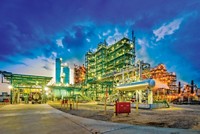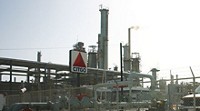Advertisement
Grab your lab coat. Let's get started
Welcome!
Welcome!
Create an account below to get 6 C&EN articles per month, receive newsletters and more - all free.
It seems this is your first time logging in online. Please enter the following information to continue.
As an ACS member you automatically get access to this site. All we need is few more details to create your reading experience.
Not you? Sign in with a different account.
Not you? Sign in with a different account.
ERROR 1
ERROR 1
ERROR 2
ERROR 2
ERROR 2
ERROR 2
ERROR 2
Password and Confirm password must match.
If you have an ACS member number, please enter it here so we can link this account to your membership. (optional)
ERROR 2
ACS values your privacy. By submitting your information, you are gaining access to C&EN and subscribing to our weekly newsletter. We use the information you provide to make your reading experience better, and we will never sell your data to third party members.
Safety
Security Dispute Reaches Congress
Bayer admits using security law to block public access to chemical accident information
by Jeff Johnson
April 27, 2009
| A version of this story appeared in
Volume 87, Issue 17

BAYERCROPSCIENCE USED antiterrorism security regulations to keep the public from knowing details about a cascade of failures that led to an explosion and fire as well as the deaths of two workers at its Institute, W.Va., chemical facility last year, the company admitted at a congressional hearing on April 21.
The company has been embroiled in a dispute with the Chemical Safety & Hazard Investigation Board (CSB) over what information the independent federal board can tell the public about the Aug. 28, 2008, accident (C&EN, April 20, page 36). Bayer had identified some 2,000 documents as possibly "sensitive security information" (SSI), a classification that restricts CSB's ability to make them public, according to a report by the House Energy & Commerce Subcommittee on Oversight & Investigations.
At a subcommittee hearing last week, William Buckner, president and CEO of Bayer CropScience, said in a prepared statement that Bayer was invoking SSI in part "to limit negative publicity generally about the company or the Institute facility, [and] to avoid public pressure to reduce the volume of MIC [methyl isocyanate] that is produced and stored at Institute by changing to alternative technologies or even calls by some in our community to eliminate MIC production entirely."
In 1984, the accidental release of MIC led to thousands of deaths in Bhopal, India, but at the hearing, Bayer defended its storage of MIC, saying it is used in four of the company's processes and is amply protected.
CSB's preliminary investigation found that the accident was due to a runaway reaction in the methomyl pesticide unit, which uses MIC as a feedstock. Contributing to the accident was Bayer's decision to bypass three safety locks during unit start-up. MIC air monitors near the unit were also not working.
CSB Chairman John Bresland told the subcommittee that the accident could have been much worse. The explosion sent a 5,000-lb vessel flying 50 feet north through a maze of steel beams and pipes; if it had flown south, it would have hit a storage tank holding 7 tons of MIC, he said. Bayer, Bresland added, is the only U.S. company that continues to store large quantities of MIC.
Rep. Bart Stupak (D-Mich.), subcommittee chairman, tells C&EN he intends to modify plant security laws to restrict companies' use of SSI designations.




Join the conversation
Contact the reporter
Submit a Letter to the Editor for publication
Engage with us on Twitter